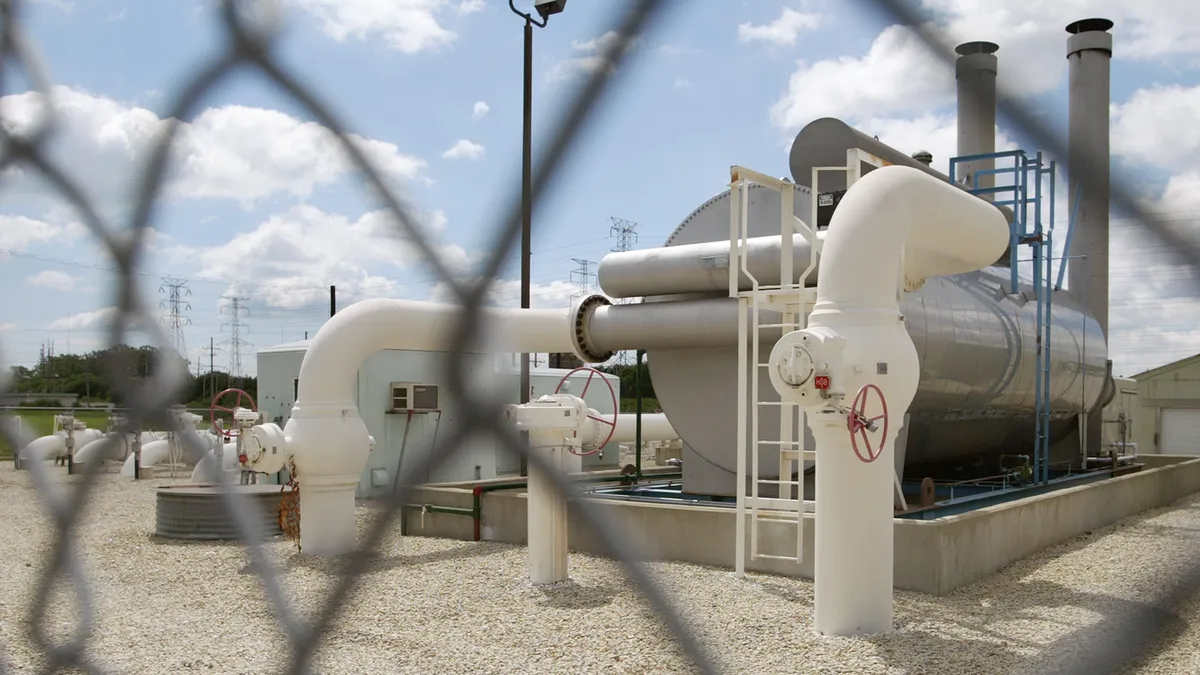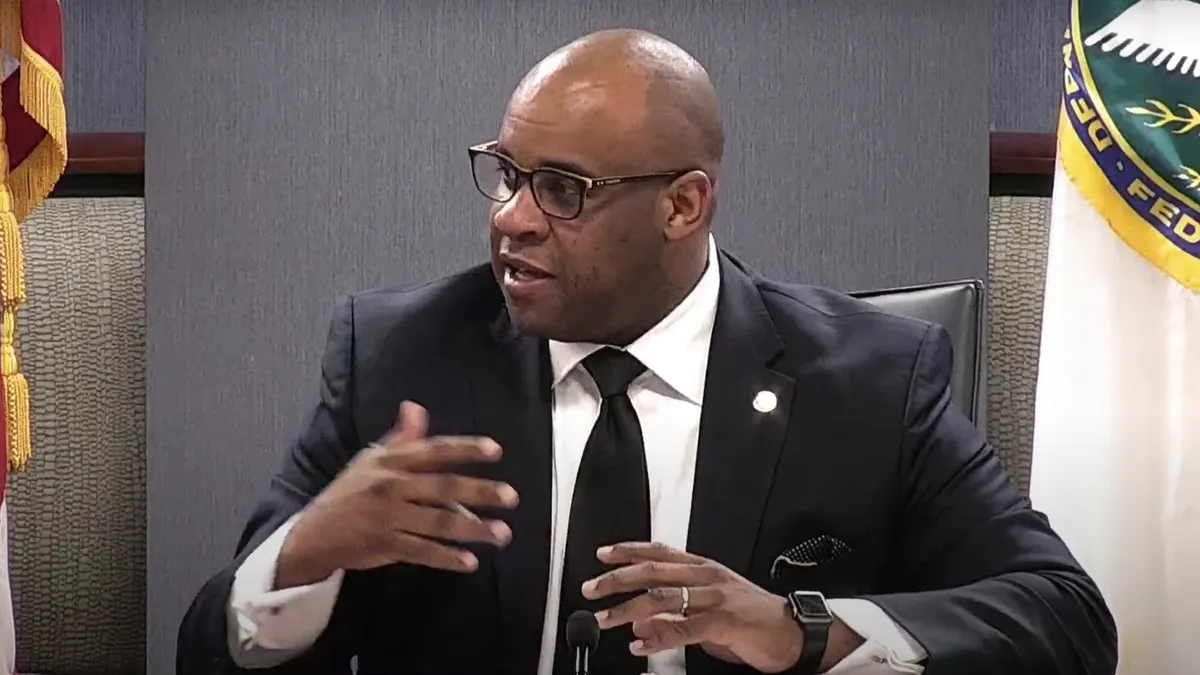UPDATE: Dec. 6, 2021: The Federal Energy Regulatory Commission on Friday issued a temporary certificate so the Spire STL natural gas pipeline can keep operating until the agency makes a decision on the U.S. Court of Appeals for the District of Columbia Circuit’s decision vacating the permit.
FERC rejected the Environmental Defense Fund’s call to place conditions on the temporary permit for the pipeline that serves the St. Louis area. It also declined to levy fines on Spire, saying no one alleged the company violated the Natural Gas Act or commission regulations.
Also, Spire on Friday asked the Supreme Court to overturn the appeals court's decision to vacate the pipeline’s permit. The Supreme Court in October refused to stay the decision.
The Federal Energy Regulatory Commission intends to issue an order that could allow the Spire STL natural gas pipeline to continue operating before a temporary permit expires on Dec. 13, according to FERC Chairman Richard Glick.
FERC's other three commissioners said Thursday they supported a vote before the permit ends on giving Spire more time to keep the pipeline running.
Spire has been warning the St. Louis area could face natural gas shortages this winter if FERC doesn't extend a temporary permit for the 65-mile pipeline between Illinois and Missouri.
The U.S. Court of Appeals for the D.C. Circuit in June vacated FERC's approval of the $287 million pipeline, saying the agency failed to properly determine whether the project was needed.
In response, FERC in September issued Spire a 90-day certificate to keep operating the pipeline while the agency considers the company's request for a temporary permit so the pipeline could run through at least the winter. The agency is also preparing to respond to the court decision.
FERC commissioners will likely meet the mid-December deadline to issue a temporary certificate for the pipeline, Glick said during a press briefing Thursday.
"I think all of our colleagues would want to have a vote on this order ... before December 13 and with their willingness to vote I think we'll be able to get an order out before that," Glick said.
FERC Commissioner Mark Christie called for issuing a temporary certificate as soon as possible.
"It needs to be clean, no extraneous issues, just maintain the status quo, keep that system operating, at least through the winter," Christie said. "That's the way to eliminate uncertainty and we won't have to have people worried and politicians worried."
Glick urged Spire Inc. to stop "fear mongering" that the pipeline might be shut over the winter.
"They have certainly gotten people worked up, suggesting that we're going to do something to shut off their natural gas and I think that that is beyond the pale in terms of what's appropriate advocacy," Glick said.
If FERC wanted to shut the pipeline down, it wouldn't have issued the temporary 90-day order in September, according to Glick.
Glick aims for bipartisan decisions
With Willie Phillips poised to join FERC, giving Democrats a 3-2 majority, Glick said he plans to continue working with his Republican colleagues at the agency to craft widely supported decisions.
Glick said when he started at FERC in 2017 there were times when Republican commissioners, who were in the majority, stuck together and didn't talk to the Democratic members.
"I don't think that that's a healthy approach, and I certainly don't expect or don't anticipate that we're going to do that either," Glick said.
"My goal is always to start with trying to make sure we can try to get all the votes."

Richard Glick
Chair, Federal Energy Regulatory Commission
Glick said he has worked closely with Commissioner Christie, a Republican, to get his vote on a wide variety of issues, while Commissioner James Danly, a Republican, also joins in some of those decisions.
"My goal is always to start with trying to make sure we can try to get all the votes," Glick told the press. "In this case, all five votes when Commissioner Phillips is actually sworn in. I intend to work in a bipartisan manner and not assume because we have three Democrats that we're just going to roll the Republicans all the time. That's not the best way for FERC to operate."
In an example of how FERC commissioners don't vote in lockstep with other members of their party, Democratic Commissioner Allison Clements dissented on an order that will lower the base return on equity (ROE) for Exelon's Constellation Mystic Power subsidiary 0.2 percentage points to 9.19%.
Clements said FERC's methodology doesn't protect consumers or produce just and reasonable rates at a time when major investments in the transmission system are looming.
FERC also cut the ROE for the DATC Path 15 power line in California to 10.86% from 13.5%. Clements dissented while Danly echoed comments he made in the Mystic decision that FERC's ROE methodology is too complicated and may cause "great uncertainty."
Glick, Clements outline views on transmission
During the meeting, Glick and Clements highlighted recent action related to transmission development and the agency's review of possible transmission-related rule changes.
The recently signed infrastructure bill includes "significant" funding for electric transmission programs at the Department of Energy, Glick noted.
"A substantial buildout of the transmission grid is required to help facilitate the transition to the clean energy future and address threats that extreme climate change poses to the reliability and resilience of the grid," Glick said.
FERC and the National Association of Regulatory Utility Commissioners are working together to explore ways to improve the transmission planning process. Staff at the federal agency is also pouring over initial comments on possible reforms to the transmission planning, cost allocation and interconnection processes. The next round of comments are due Nov. 30.
"Smart" transmission investment can save customers money by lowering the delivered cost of energy, according to Clements.
"The goal should be to build a system that is most likely to result in the least total costs for customers," Clements said. "If transmission unlocks access to low cost resources, enhances competition and mitigates the cost to some extent of extreme weather events, it will be a net win for consumers."
Clements asked stakeholders to file comments on how transmission costs can be kept as low as possible and how to oversee the transmission planning process to protect consumers.
"Transmission owners will continue to seek out investment opportunities based on their financial incentives," Clements said. "The commission's responsibility is to align those financial incentives with investment that will meet future demand cost effectively."























